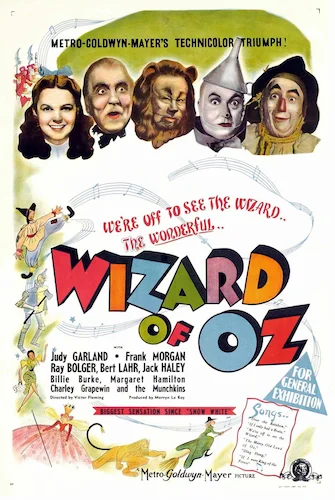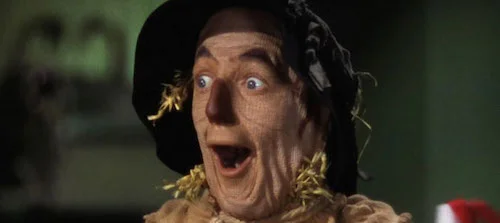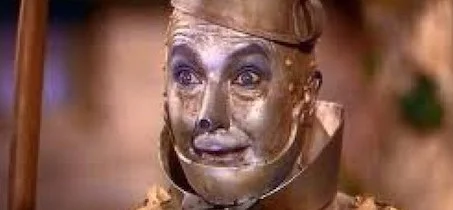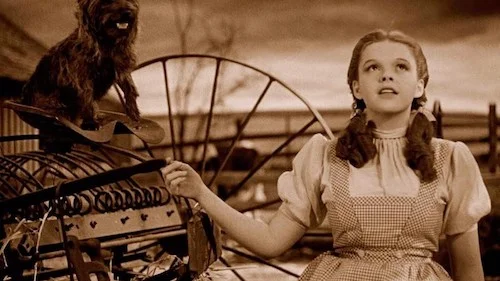National Kids Day: The Wizard of Oz
As part of National Kids & Pets Day, we decided finding nostalgic childhood films was a bit easier than combining both themes. We are taking this opportunity to review ten films that have been deemed staples of the youths of varying generations. This article looks at The Wizard of Oz.
I loved The Wizard of Oz as a child. Who didn't? It is eighty years old, and still an immediate go-to for adults to share with their kids. The characters, music, and tale are so simple to understand, and so easy to love.
Fast forward to film school. Perhaps I was trying to be edgy, but I didn't understand the pitch perfect acclaim the film had. She could have clicked her heels the entire time. All of this was a dream. Why does no one care about these gargantuan narrative faults? Is it just me?
The more I study film, the more I realize it was just me. I had to find my own three new friends: the Scarecrow of Context, the Tin Man of Theory, and the Lion of Maturation.
The Scarecrow of Context
The Wizard of Oz was originally created by author L. Frank Baum. It was adapted a number of times even well before the 1939 classic we know (including a 1910 silent short). Before film, there were stage renditions. The story of Oz was a well known one by the time 1939 hit. Metro-Goldwyn-Mayer had a whole series of pressures on them. Talkies were popular for over a decade at this point. Musicals were all the rage, as theatre was making its way into film with true force. This was a highly profitable possibility, but how was it going to unfold?
Enter Victor Fleming, who was hopping between this film and Gone With the Wind due to the troubled shoots of both works. Both films were insanely ambitious. The technical achievement that Gone with the Wind became is undeniable to this day. However, the heart was left in Oz. A special effects display of its own right, Oz had the charm that Wind sacrificed for romantic tension. No romances, here. Just a young girl trying to keep what she loves with her for the rest of her life.
Oz had to work. So it needed to convince audiences to stick around for the entire ride. The transition from Kansas to Oz now is astounding; imagine being one of the first to see the film back then. We have black and white (or sepia, in some versions) suddenly shift into full colour, in an era where colour was particularly rare (Gone with the Wind was also Technicolor, to give some perspective). This transition is one of pure movie magic. No one forgets its initial impact on us. Never dismiss that first time. Not many films can pull off a bait-and-switch this well.
The Tin Man of Theory
Oz itself is beautiful, but truly investing my time into film history made it even greater. From the special effects (splice-hopping, rear projections, and more), to the visual aesthetic, this is pure Georges Méliès. Oz is so reminiscent of the earliest magic silent films, because it follows (and ups) many of that era's tricks and appeal. I'm not entirely sure if it's because The Wizard of Oz is a product of its time, because you can think of other films around that time that behave slightly differently (again, the effects in Gone with the Wind).
Understanding how films work on more than a narrative level also makes Oz grow as a story. The echoing of the melody to “Somewhere Over the Rainbow” announcing Dorothy's initial entering of Oz is an overwhelmingly powerful assemblage. Think of all the other aesthetic cues, callbacks and references. This is a smartly sewn-together film.
There's also an understanding as to how my earlier complaints hold little weight in such a film; one that is bent on coincidence and chance, anyway. This is all a dream, but it mirrored her real life. The slippers were always on her feet, but the answer to her problems (confidence) was right in front of her the entire time in real life, too. Oz himself is a facade, just like the entire magical land is. It isn't about the dead end, but the journey there. Oz is all about these narrative red herrings.
The Lion of Maturation
Being a hip undergrad is no excuse for trying to find problems in films. Taste and knowledge grow with time and experience. Trying to be a contrarian to a classic for no particular reason is stupid. I've had highly negative things to say about a variety of works that are dear to people over the years (avoid my The Goonies review if you don't want to know what that is like). What is the point in bashing a film meant for families that gets the job done in such a signature way? So what if the Witch of the West melts by water. This world isn't real. This is all a dream. This is the world according to Dorothy. The Witch melts easily, because Dorothy wants Miss Gulch and her grumpy ways to disappear.
Becoming a David Lynch obsessive has also altered how I feel about the film. Dreams can be an experience, but they are meant to say more about the character on a mental, and spiritual level than a literal one. Lynch himself loves The Wizard of Oz (in case Wild At Heart didn't make that clear). The dream is an escape for us, but it is also an analysis of the world tethered by rules being broken with a new perspective. Waking up from a dream at the end of a film is a lazy narrative no-no, unless you know what you are doing. Lynch does. So does The Wizard of Oz.
Why fight a film for taking part in narrative conflicts, if it is an enhancement rather than a bad example? Many children's films (even ones reviewed today) are based on kids entering a new fictitious realm, and returning new. The Wizard of Oz is one of the finest examples of this. It has a brain (with its clever character developments, for its time), a heart (a knack for making you feel for these characters and this world), and courage (delivering all of this with countless special effects, no matter what).
The Ruby Slippers of Cyclical Reevaluation
The production was a mess. Jack Haley's skin didn't react well to the make up job for the Tin Man. Margaret Hamilton experienced burns after her flammable make up (for the Witch of the West) responded to the flames that made her character disappear. Many other notable issues took place. The film had to compete with other powerful adult films; what family or childrens' films were using a budget this big with ambitious this great? It had to work.
It worked for me as a child, and it works for me again as an adult that is actually paying attention. Something here just makes the return to a familiar place even greater with fresh, willing eyes. It may be a prime example of a film that will only suffer if you watch films to find issues. It is a humbling work as a critic. It taught me not to pick works apart, but to evaluate as a whole. Ask non cinephiles who Judy Garland is, and then ask them Vivien Leigh. Of course, Leigh is a legend in her own right, but Garland and her work have transcended not just time, not just age, but demographics, too. Even the marginally curious about film will know Scarlett O'Hara. Almost everyone out there knows Dorothy and Toto.
The Wizard of Oz is a series of resonating connections, that collapse and hit the next target like dominoes. It is a never ending wonder that extends to after the credits. The film was unlike anything else when it first came out. It's 2019. I'd argue it still is unlike anything else.
Andreas Babiolakis has a Masters degree in Film and Photography Preservation and Collections management from Ryerson University, as well as a Bachelors degree in Cinema Studies from York University. His favourite times of year are the Criterion Collection flash sales and the annual Toronto International Film Festival.









